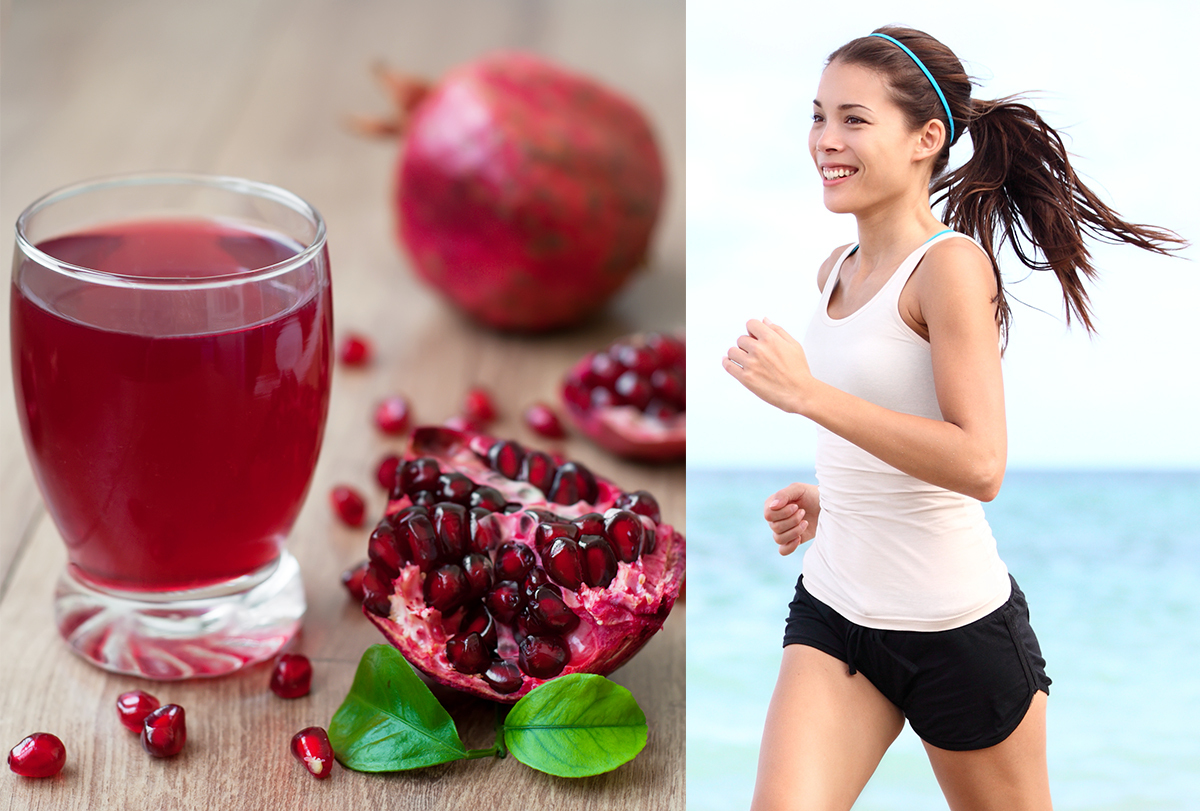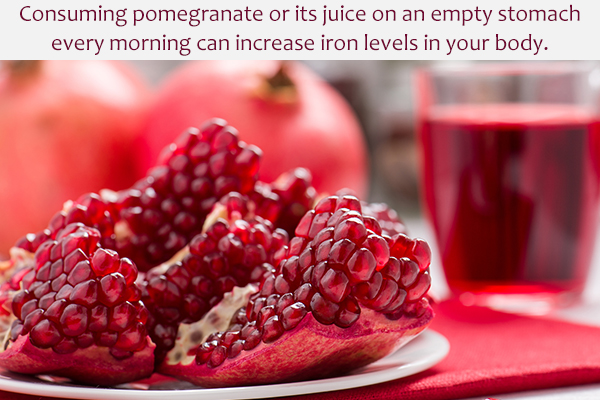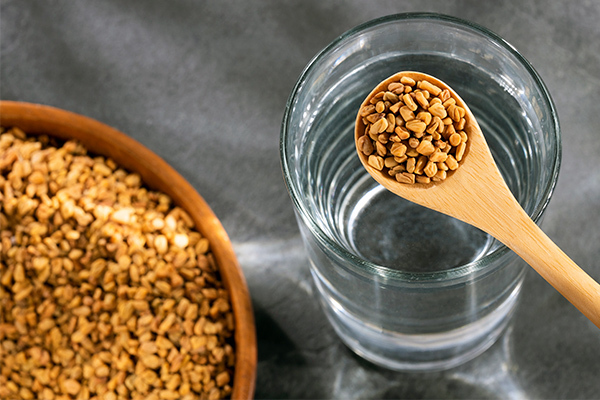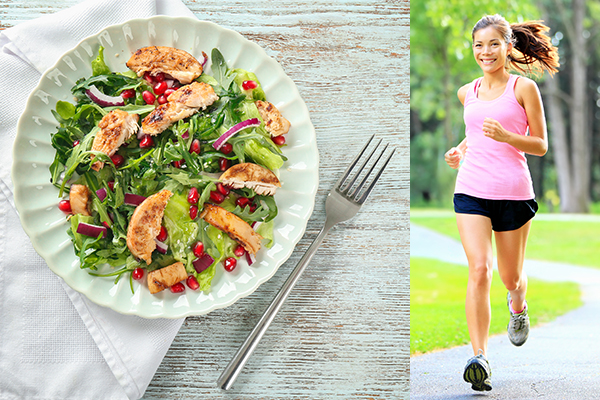In this article:
Anemia is commonly caused by iron or vitamin deficiencies. Therefore, the consumption of a balanced diet with high-iron foods is essential for the treatment and prevention of anemia.

It is also recommended to increase the intake of vitamin C as it helps the body absorb iron.
Home Remedies for Anemia
The following home remedies can help improve your condition and associated symptoms.
1. Consume pomegranates

Pomegranates are rich sources of iron and vitamins. Consuming pomegranate or its juice on an empty stomach every morning can increase the iron levels in your body.
Some studies found that pomegranate juice supplementation aided red blood cell production and increased hemoglobin concentration in healthy individuals. (1)
How to use:
Include pomegranate in a salad, or in the form of juice or smoothies in your daily diet. You may also use pomegranate supplements upon consultation from your doctor.
Pomegranates contain high amounts of vitamins and iron that can help improve anemia
2. Eat eggs
Eggs have a naturally high iron and low saturated fat content and are a good addition to your diet.
A study demonstrated that egg white proteins played a role in the alleviation of iron-deficiency anemia. (2) Another study supported the use of eggs for treating anemia and iron deficiency. (3)
How to use:
Eggs can be boiled and consumed. Additionally, they may be added to various meals, such as with leafy vegetables and whole grains.
Eggs contain high amounts of vitamins, iron, and proteins which boost the immune system and increase your energy levels.
3. Have fermented foods
Fermented foods contain beneficial microorganisms that can help improve your gut lining, leading to the proper absorption of nutrients. These foods also boost immunity levels and reduce inflammation.
A study observed that sauerkraut (fermented cabbage) aids in the absorption of iron from a meal. (4) Another study concluded that consumption of tempeh (a fermented soy product) improved maternal iron deficiency during pregnancy. (5)
How to use:
Add fermented foods to your daily diet in the form of soups or salads.
Consumption of fermented foods aids in the absorption of nutrients such as vitamins and iron by your gut.
4. Consume blackstrap molasses
These are rich in iron, minerals, and B vitamins. Consuming 1 tbsp of blackstrap molasses mixed in a cup of hot water can help improve iron deficiency anemia as it contains copper, sulfur, and fructose. (6)
Further research on the safety and efficacy of blackstrap molasses is required for its development as a cost-effective dietary supplement. (6)
5. Eat fenugreek

Fenugreek seeds are known to have nutritive and restorative properties. It also helps improve hemoglobin levels in the body and can be used as a regular dietary supplement. Therefore, fenugreek can aid in the treatment and prevention of anemia. (7)(8)
How to use:
Mix one teaspoon of fenugreek leaves and seeds with one glass of hot water. Allow the mixture to steep for 10 minutes and strain. Add lemon juice and honey as per your taste and consume.
6. Eat beetroot
When consumed as a part of the diet or in forms of salad, beetroot can help improve the deficiencies associated with anemia. However, its use is based on anecdotal evidence, and the mechanism is not clear. Therefore, further research is required to establish its efficacy.
7. Consume sesame seeds
Since they have a high iron content, adding black sesame seeds to your daily diet helps increase hemoglobin levels in the body.
Besides, it also aids in improving iron absorption. However, these claims are based on anecdotal evidence and further research is required to establish the efficacy.
8. Eat dates and raisins
These dry fruits are loaded with iron, copper, magnesium, and vitamins A and C. Therefore, including dates and raisins in your daily diet, can facilitate iron absorption and help boost the immune system.
9. Use moringa leaves
It is not only rich in iron but also contains nutrients that aid iron retention including folic acid, vitamin B12, and vitamin C. Including moringa leaves in your regular diet has been found to be efficacious anecdotally.
10. Consume figs
They have been anecdotally used for increasing iron levels in the body due to their high iron content. For this, you may soak 4–5 fig leaves in water overnight and consume them in the morning.
11. Use copper vessels
Consuming water stored in copper vessels can help increase iron level in the body and also provide other natural minerals.
Lifestyle Changes to Manage Anemia
Consuming a well-balanced diet and regular exercise are key factors in the management of anemia.

1. Consume a healthy diet
It is imperative to supply your body with all the vital nutrients for its proper functioning. Consuming a healthy, balanced diet ensures the optimum intake of nutrients, such as:
Iron: Iron is essential for hemoglobin synthesis. This mineral can be derived from various food sources, including:
- Red meat
- Poultry
- Fish (tuna, salmon, shrimp, etc.)
- Beans
- Lentils
- Dark green leafy vegetables
- Dried fruits
- Nuts
- Soy
- Iron-fortified cereals and bread
Folate: Folate is found in the following food items:
- Fortified cereals
- Meat
- Spinach
- Beans
- Citrus fruits and juices
- Cantaloupe
- Papaya
- Banana
Vitamin B12: This essential vitamin can be obtained from:
- Meat
- Fish
- Fortified cereals
Vitamin C: This vitamin aids in the absorption of dietary iron and can be derived from:
- Citrus fruits and juices
- Melons
- Berries
- Bell peppers
- Broccoli
- Brussels sprouts
- Kale
2. Exercise regularly
Exercises such as jogging, walking, and swimming help strengthen the muscles, improve cardiovascular function, increase energy, and improve overall health. Exercise is especially useful for people with kidney diseases as it stimulates the production of red blood cells.
One study observed that aerobic exercise helped improve the immune system and inflammatory markers in patients with sickle cell anemia. (9)
3. Take some rest
Exercise and staying active are important, but it is crucial to balance it with proper rest. You may take short naps during the day. However, avoid prolonged bed rest as it can increase weakness.
Additional Tips to Prevent Anemia
The following tips can help prevent the aggravation of anemia:
- Avoid dairy products as they can inhibit the absorption of oral iron.
- Do not smoke. Smoking has a negative impact on your overall health and increases the body’s requirement of vitamins.
- Refrain from consuming coffee, tea, or cocoa if you have low levels of iron.
Most-Asked Questions About Anemia

How long does anemia last?
The duration of anemia is dependent on its cause and severity. If anemia results from an iron or vitamin deficiency, the problem improves once the nutrient levels are corrected with treatment.
However, if hereditary factors cause the anemia, it will remain lifelong. Nevertheless, it can be managed with self-care tips and medical interventions.
What are the possible complications of anemia?
Mild anemia is not risky and can be easily treated. However, prolonged, severe cases of anemia can result in organ damage due to the constant lack of oxygen. Additionally, the heart may suffer damage as a result of the stress caused by increased pumping. In some cases, the underlying cause of anemia may be fatal in itself.
Can anemia be prevented?
Most types of anemia cannot be prevented, but consuming a proper diet high in iron and vitamins can help avoid deficiency anemias.
Final Word
Anemia is a common problem that requires proper treatment. It is essential to correct your nutritional intake and use iron supplements if needed. Treatment may take several months, during which you may need to get periodical blood tests to measure the iron levels in your body.

- Was this article helpful?
- YES, THANKS!NOT REALLY


